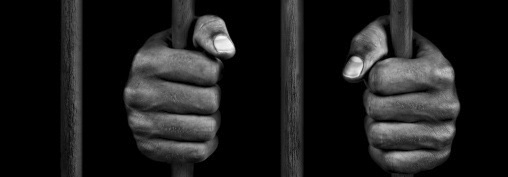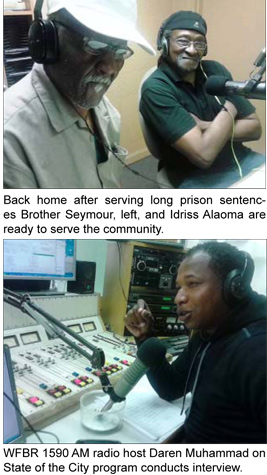
When it comes to incarceration, the numbers and the reality are daunting: There are about 2.3 million people locked up in prisons and jails across America. Nearly one million of those who are incarcerated are Black.
The Pew Center reports, “Black men were more than six times as likely as White men to be incarcerated in federal and state prisons, and local jails in 2010, the last year complete data are available. … That is an increase from 1960, when Black men were five times as likely as Whites to be incarcerated.”
“Together, African American and Hispanics comprised 58 percent of all prisoners in 2008, even though African Americans and Hispanics make up approximately one quarter of the U.S. population,” the NAACP added.
The majority of these Black men and women will be coming home and returning to families and neighborhoods that often need help themselves.
Not every returnee is itching to commit crime or anxious to do wrong. Many are like Idriss Alaoma, or Brother Idriss, and Brother Seymour, who are out of the system in Maryland, anxious to do good and determined to help others avoid incarceration and the traps of society.

Brother Idriss served 41 years behind bars and at 69 years of age is strong–and on a mission. He and Brother Seymour, who is 83-years-old, are part of Maryland CURE. “Maryland CURE is a state chapter of International CURE, an organization dedicated to reducing crime through reform of the criminal justice system since 1972. CURE is the oldest and largest prison reform organization in the United States,” says the group.
CURE is devoted to reducing the prison population and believes “should only be used for those who absolutely must be incarcerated,” not as “warehouses for humanity.”
Brother Idriss and Brother Seymour have experienced some of the worst treatment and the worst conditions imaginable. Yet they are not bitter, they are better. They have knowledge, they have wisdom and they have understanding. They don’t want others to suffer as they suffered or make the mistakes that they made.
Brother Seymour, in an interview with WFBR 1590 AM radio host Daren Muhammad’s State of the City program, talked about how he took advantage of self-help programs and improved himself.
More programs and engagement are needed and we cannot simply give up on our family members, friends, loved ones because they are behind bars, said these two insightful elders.
And as Brother Seymour stressed, “The system has to change.”
You can’t reform inmates if staffers are abusive and disrespectful and treat these human beings like “beasts,” he said.
“We need everybody who knows what it is to be human. We need everybody to love and to share. We need everybody to come together,” he said. Brother Seymour was incarcerated at age 15 and spent over 50 years of his life behind the walls. Fathers, sons, daughters, grandfathers need to be connected to their families, not be abandoned, he said. Such abandonment allows the system to dehumanize and abuse those who will eventually return to Black communities. They can either return in an angry and bestial state or they can return as renewed men and women because of our service to them.
Brother Idriss said many others are coming home with a new way of thinking, a new way of walking, a new way of talking, a new way of living. He wants to use his experiences to change lives and halt suffering.
“There is a war against young Black men and it has been going on for quite a while,” he said. While Brother Idriss went into prison at 21, he said now 16-, 17-, 18-year-olds are coming into the system with multiple life sentences.
Under the guise of a war on drugs, this war has decimated our communities but if we utilize the skills, the life lessons and the hearts of these men, we can hammer away at this crisis.
“These men have paid for any mistakes that they made and should hold their heads high and rejoin civilization. Because where we were was not civilized,” Brother Idriss added. He thanked groups that come in to serve and organize those locked behind the walls, especially the Nation of Islam for imparting knowledge, giving inmates a refuge and even teaching them to give up pork for their physical health.
“We must learn the streets are filled with so much danger,” said Brother Seymour.
They urged young men to seek education, knowledge, spirituality and places to seek help and learn a trade. They urged Black youth to join organizations to learn and understand changes happening around them. Groups also need to put out information about what they offer so young people know where to come for help before they go to jail, they added.
We welcome Brother Idriss and Brother Seymour back and we welcome home all of the brothers and sisters. We welcome them back to the community and we welcome them to our common struggle.












